外研版英语必修一Module1
- 格式:pptx
- 大小:1.23 MB
- 文档页数:7
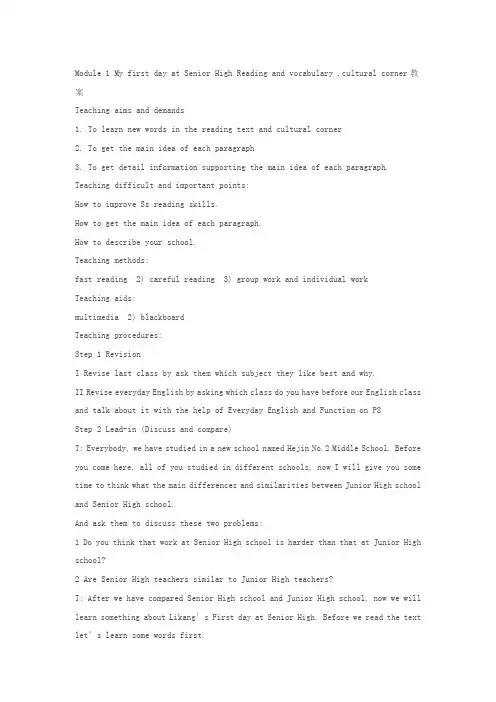
Module 1 My first day at Senior High Reading and vocabulary ,cultural corner教案Teaching aims and demands1. To learn new words in the reading text and cultural corner2. To get the main idea of each paragraph3. To get detail information supporting the main idea of each paragraph. Teaching difficult and important points:How to improve Ss reading skills.How to get the main idea of each paragraph.How to describe your school.Teaching methods:fast reading 2) careful reading 3) group work and individual workTeaching aids:multimedia 2) blackboardTeaching procedures:Step 1 RevisionI Revise last class by ask them which subject they like best and why.II Revise everyday English by asking which class do you have before our English class and talk about it with the help of Everyday English and Function on P8Step 2 Lead-in (Discuss and compare)T: Everybody, we have studied in a new school named Hejin No.2 Middle School. Before you come here, all of you studied in different schools, now I will give you some time to think what the main differences and similarities between Junior High school and Senior High school.And ask them to discuss these two problems:1 Do you think that work at Senior High school is harder than that at Junior High school?2 Are Senior High teachers similar to Junior High teachers?T: After we have compared Senior High school and Junior High school, now we will learn something about Likang’s First day at Senior High. Before we read the text let’s learn some words first.Step 3 VocabularyDeal with the vocabulary on P2 by finishing the questions in the part.Step 4 ReadingI. ScanningRead the text quickly and try to find the answer to these questions:a) What are the differences between Likang’s Junior High school and Senior High school?b) What are the two things the English teacher thinks important to do in class?c) What are the two things that the English teacher wants to improve?Ⅱ.Careful-readingAsk the students to read the passage again and find out which word in the box in the fifth part of Reading and Vocabulary on P4. And ask them try to guess the meaning and explain the words in English according to the text.Ask the students to read the three summaries of Likang’s opinion about the new school in the sixth part in Reading and Vocabulary on P4. Decide which the best is. Ⅲ. DiscussionT: We have known the Likang’s life at Senior High, is your English classroom like Likang’s? is your class the same size as his? Is the number of boys and girls the same? Are you looking forward to doing your English homework? Now please discuss with your partner and compare your school life with Likang’s.Step5 Cultural cornerT: we have learned Likang’s school life at senior high; do you want to know the life of the teenagers in the similar age of you in other countries? Now please turn to P9, let’s read the text in cultural corner and learn something about the Senior High school life in the US.I. Ask the students to listen to the tape and read the text.II. Ask the students to answer the following questions:a) What are the differences between the grades in China and the US?b) How is the school year divided?c) How long does the Summer Vacation last?d) When do they start and finish school?e) What do they do after school?III. Ask the students to prepare a short reply to introduce the school system, vacation, study time & after-school activities in China by imitating the letter in Cultural corner.Step6. SummaryThe teacher summary the class by comparing the school life in China and the US. Step7. Homework:I. Write a reply to Rob MarshallII. Read the text for as many times as they canIII. Preview the language points in these two passages.。
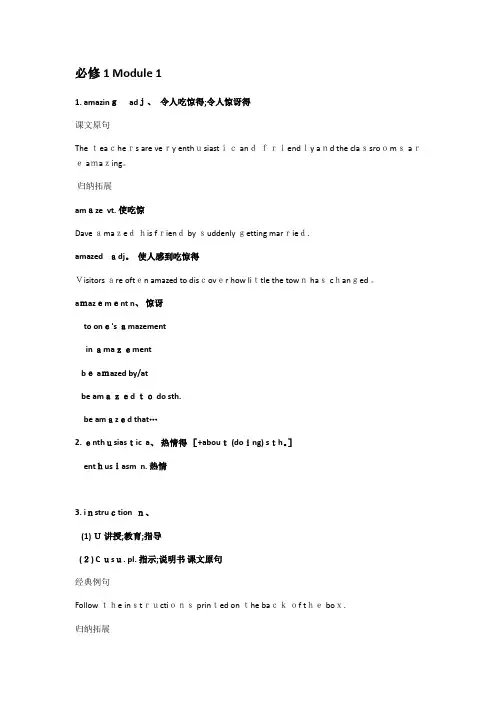
必修1 Module 11. amazingadj、令人吃惊得;令人惊讶得课文原句The teachers are very enthusiastic andfriendly and the classrooms are amazing。
归纳拓展amaze vt. 使吃惊Dave amazedhis friend by suddenly getting married.amazed adj。
使人感到吃惊得Visitors are often amazed to discover how little the town has changed 。
amazement n、惊讶to one's amazementin amazementbe amazed by/atbe amazed to do sth.be amazed that…2. enthusiastic a、热情得[+about (doing) sth。
]enthusiasm n. 热情3. instruction n、(1) U讲授;教育;指导(2) C usu. pl. 指示;说明书课文原句经典例句Follow the instructions printed on the backof the box.归纳拓展(1)follow instructions 服从指示under one’s instruction在某人得指导下(2)instruct vt。
指导;教导;命令instruct sb。
to do sth、instruct sb. in sth、教授某人某方面得内容例句:You will receive basic instructions in navigation、4、 attitude n、态度;瞧法;姿态课文原句Describe your attitude to studying English、经典例句He has a bad attitude towards his schoolwork、As soon as they found out I was a doctor their whole attitude changed、归纳拓展attitude to/toward(s) sb、/sth. 对…得瞧法/态度have a positive/negative attitude to/ towardssb、/ sth。

外研版高一英语教案【篇一:外研版高中英语必修一 module1教案】module 1 my first day at senior high一、教材研究本模块的中心话题是―一位高中新生到新学校的一天‖,具体介绍高中新生第一天到校观察和接触到的人和事物及个人的感受,内容紧密结合学生现实生活。
本节课着重培养学生的阅读能力。
通过文章的阅读学习,培养学生热爱新学校、新班级和新同学的感情,鼓励学生参与各种英语活动,克服困难。
本模块的内容主要有:课时1:衔接初中科目,并比较初高中的不同点。
课时2:阅读李康的高中第一天。
课时3:阅读文知识点学习。
课时4:语法1,2,学习一般现在时,现在进行时和以ing和ed结尾的形容词。
课时5:听力部分的新单词和文化角的阅读。
课时6:写作,写一篇关于自己学校的文章。
二、学情研究自己一直参与英语课题研究,以及对新课标的学习,教学方法有了一定的改进,比较重视课堂上以学生为主体的形式,但总感觉在单词教学环节上还比较被动。
由于高一新生在每个初中的英语学习程度参差不齐,为了满足不同学生的发展需求,我改变了以往以习题、听写为主的复习方法,提前布置任务让学生预先用自主学习单预习,尽量多的使用本模块词汇编写小故事,基础差一些的学生可以说句子或组短语,在自主的选择和练习中达到了复习的目的,分层次的布置任务也照顾到全体同学,同学们描述自己的高中第一天,每个人都能用到10个以上的本模块词汇,效果很好。
这也是本课设计的闪光点之一。
period 1 introduction一、目标点击:a级目标(1)复习和学科有关的单词:biology, chemistry, history,english, japanese, geography, russian, it, chinese, mathematics, physics, pe(2)掌握并记忆本课的重点词汇和短语:academic, enthusiastic, amazing, information, attitude, behavior, comprehension, handwriting, instruction, method, photograph, spelling, textbook(3).词组:be similar to, one’s attitude to/towardsb级目标:1.复习和学科有关的单词:biology, chemistry, history,english, japanese, geography, russian, it, chinese, mathematics, physics, pe2.会读新单词二:重点难点(1)学习和掌握本课生词(2)多层次的训练阅读能力,提高阅读水平三:拓展链接初中时学生已经学过各个学科名,现在结合初中熟悉的知识点来学习高中各学科教师的特点。
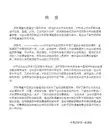
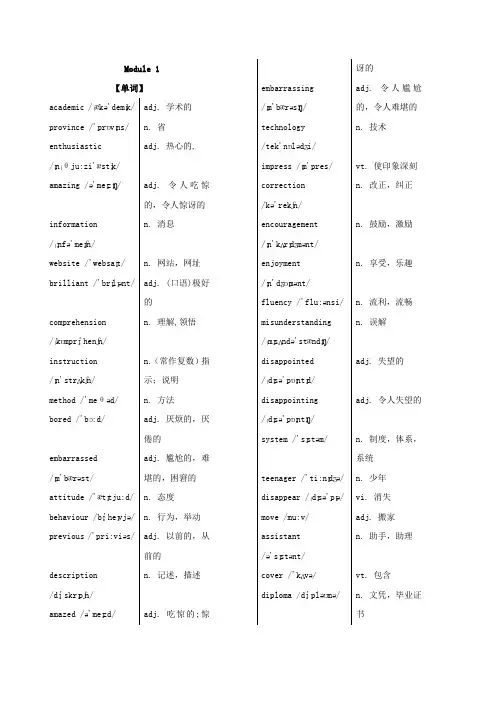
Module 1【单词】academic /ˌækə'demɪk/ adj. 学术的province /'prɒvɪns/ n. 省enthusiastic/ɪnˌθju:zi'æstɪk/adj. 热心的, amazing /ə'meɪzɪŋ/ adj. 令人吃惊的,令人惊讶的information/ˌɪnfə'meɪʃn/n. 消息website /'websaɪt/ n. 网站,网址brilliant /'brɪlɪənt/ adj. (口语)极好的comprehension/ˌkɒmprɪ'henʃn/n. 理解,领悟instruction /ɪn'strʌkʃn/ n.(常作复数)指示;说明method /'meθəd/ n. 方法bored /'bɔ:d/ adj. 厌烦的,厌倦的embarrassed /ɪm'bærəst/ adj. 尴尬的,难堪的,困窘的attitude /'ætɪtju:d/ n. 态度behaviour /bɪ'heɪvjə/ n. 行为,举动previous /'pri:viəs/ adj. 以前的,从前的description/dɪ'skrɪpʃn/n. 记述,描述amazed /ə'meɪzd/ adj. 吃惊的;惊讶的embarrassing/ɪm'bærəsɪŋ/adj. 令人尴尬的,令人难堪的technology/tek'nɒlədʒi/n. 技术impress /ɪm'pres/ vt. 使印象深刻correction/kə'rekʃn/n. 改正,纠正encouragement/ɪn'kʌrɪdʒmənt/n. 鼓励,激励enjoyment/ɪn'dʒɒɪmənt/n. 享受,乐趣fluency /'flu:ənsi/ n. 流利,流畅misunderstanding/ˌmɪsʌndə'stændɪŋ/n. 误解disappointed/ˌdɪsə'pɒɪntɪd/adj. 失望的disappointing/ˌdɪsə'pɒɪntɪŋ/adj. 令人失望的system /'sɪstəm/ n. 制度,体系,系统teenager /'ti:nɪdʒə/ n. 少年disappear /ˌdɪsə'pɪə/ vi. 消失move /mu:v/ adj. 搬家assistant/ə'sɪstənt/n. 助手,助理cover /'kʌvə/ vt. 包含diploma /dɪ'pləʊmə/ n. 文凭,毕业证书【短语】in other words 换句话说look forward to 期待,盼望at the start of 在……开始的时候at the end of 在……结束的时候go to college 上大学be divided into 被(划)分成……take part in 参加【重点词汇精讲】2. amazing adj. 令人吃惊的;令人惊讶的It’s amazing that…令人惊讶的是……(1) amaze vt. 使吃惊It amazes sb. that…= What amazes sb. is that…使某人惊讶的是……(2) amazed adj. 感到惊奇的;吃惊的。
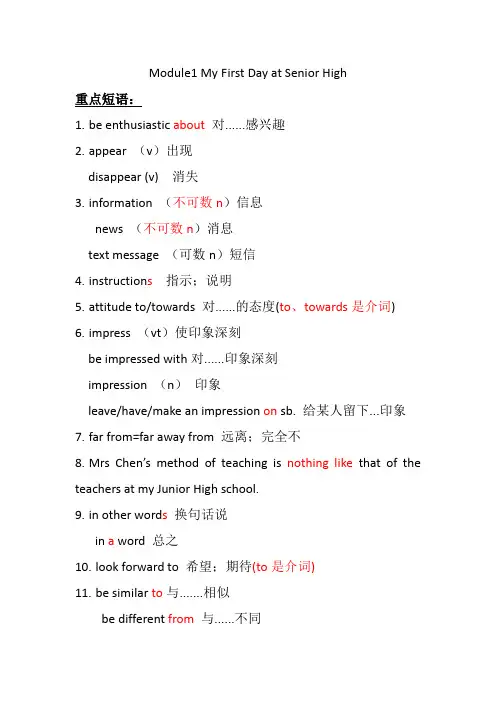
Module1 My First Day at Senior High重点短语:1.be enthusiastic about对......感兴趣2.appear (v)出现disappear (v) 消失rmation (不可数n)信息news (不可数n)消息text message (可数n)短信4.instruction s指示;说明5.attitude to/towards 对......的态度(to、towards是介词)6.impress (vt)使印象深刻be impressed with对......印象深刻impression (n)印象leave/have/make an impression on sb. 给某人留下...印象7.far from=far away from 远离;完全不8.Mrs Chen’s method of teaching is nothing like that of the teachers at my Junior High school.9.in other word s换句话说in a word 总之10.look forward to 希望;期待(to是介词)11.be similar to与.......相似be different from与......不同be the same as与......一样12.courage (n)努力encourage sb. to do sth. 鼓励某人做... encouragement (n)鼓励13.fluency (n)流利fluent (adj)流利的fluently (adv)流利地14.move (v)移动;搬家remove (v)移除15.at the start of 在......开始的时候at the beginning of 在......开始的时候at the end of 在......结束的时候16.Would you mind doing sth. 你介意做......吗?mind doing sth. 介意做...17.cover (vt)包含18.divide...into...把......分成be divided into 被分成19.take part in 参加join in 加入20.go to college 上大学21.have fun doing sth 玩得开心重点句型:1.倍数表达法:① A+be+倍数+as+形容词原级+as+B②A+be+倍数+形容词比较级+than+B③A+be+倍数+the+n(size, length,height,depth,size)+of+B注: half(一半), double(两倍), twice(两倍), times(三倍及以上),2.so的用法So do I. 我也是So I do. 我确实是重点语法:动词+ing变为形容词“感到......的”动词+ed变为形容词“令人......的”e.g.He has a ________(frighten) look on his face.(frighened/frightening)He has an_________(amaze) expression on his face.(amazing/amazed)* to one’s +名词“另某人......的是”(e.g to my surprise, to my amazement)。
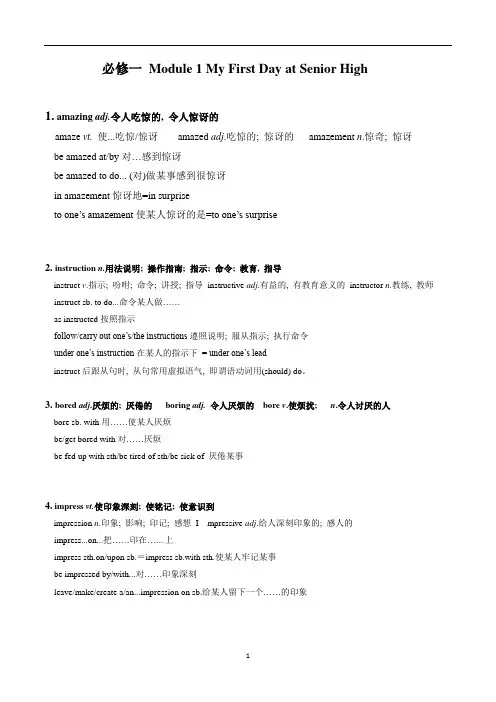
必修一Module 1 My First Day at Senior High1.amazing adj.令人吃惊的, 令人惊讶的amaze vt. 使...吃惊/惊讶amazed adj.吃惊的; 惊讶的amazement n.惊奇; 惊讶be amazed at/by对…感到惊讶be amazed to do... (对)做某事感到很惊讶in amazement惊讶地=in surpriseto one’s amazeme nt使某人惊讶的是=to one’s surprise2. instruction n.用法说明; 操作指南; 指示; 命令; 教育, 指导instruct v.指示; 吩咐; 命令; 讲授; 指导instructive adj.有益的, 有教育意义的instructor n.教练, 教师instruct sb. to do...命令某人做……as instructed按照指示follow/carry out one’s/the instructions遵照说明; 服从指示; 执行命令under one’s instruction在某人的指示下= under one’s leadinstruct后跟从句时, 从句常用虚拟语气, 即谓语动词用(should) do。
3. bored adj.厌烦的; 厌倦的boring adj.令人厌烦的bore v.使烦扰; n.令人讨厌的人bore sb. with用……使某人厌烦be/get bored with对……厌烦be fed up with sth/be tired of sth/be sick of 厌倦某事4. impress vt.使印象深刻; 使铭记; 使意识到impression n.印象; 影响; 印记; 感想I mpressive adj.给人深刻印象的; 感人的impress...on...把……印在……上impress sth.on/upon sb.=impress sb.with sth.使某人牢记某事be impressed by/with...对……印象深刻leave/make/create a/an...impression on sb.给某人留下一个……的印象5. cover v.盖/覆盖; 包括, 涉及; 报道; 足以支付; 行走一段路程; 占(面积); n.封皮; 盖子; 套子; 表面be covered with/by被……覆盖cover an area of...占地面积为……from cover to cover从头到尾under (the) the cover of 在..的掩护下;趁着6. take part in参与; 参加for the most part=mostly多半; 通常in part=partly部分地; 在某种程度上play a part in参加; 对……起作用play the part of扮演……角色7. 词义辨析]take part in, join in, join, attend(1)take part in指参加有组织的、重大的活动, 并在其中发挥积极作用。
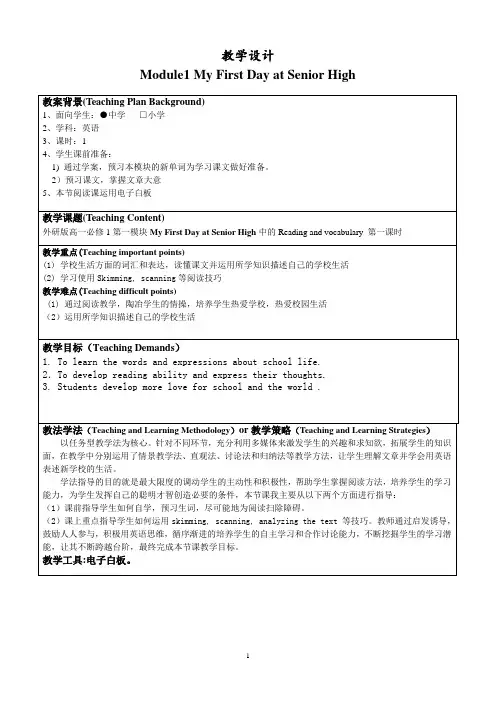
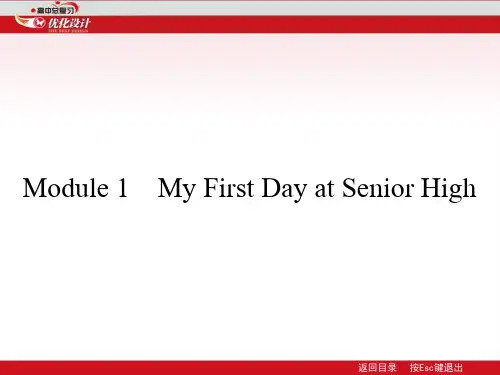
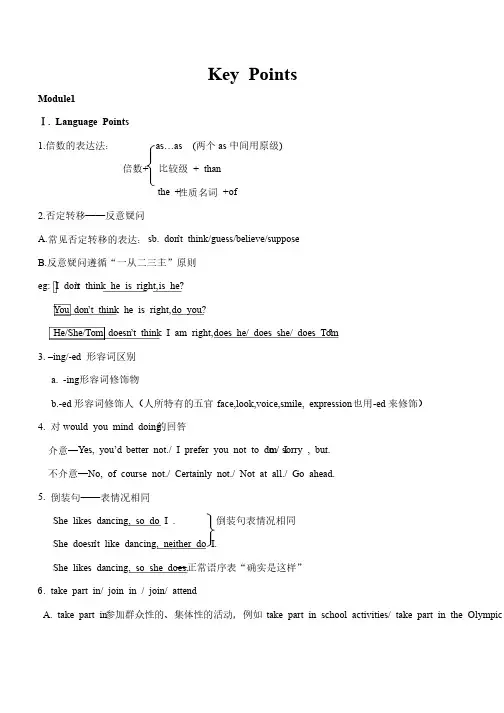
Key Points Module1 Ⅰ. Language Points 1.倍数的表达法:倍数的表达法: as as……as (两个as 中间用原级) 倍数+ 比较级比较级 + than the +性质名词性质名词 +of 2.否定转移——反意疑问否定转移——反意疑问A.常见否定转移的表达:sb. don ’t think/guess/believe/suppose B.反意疑问遵循“一从二三主”原则反意疑问遵循“一从二三主”原则eg: I don ’t think he is right, is he? You don You don’’t think he is right, do you? He/She/Tom doesn He/She/Tom doesn’’t think I am right, does he/ does she/ does Tom ?3. –ing/-ed 形容词区别形容词区别a. -ing 形容词修饰物形容词修饰物b.-ed 形容词修饰人(人所特有的五官face,look,voice,smile, expression 也用-ed 来修饰)来修饰)4. 对would you mind doing 的回答的回答的回答 介意—Yes, you’d Yes, you’d better not./ I prefer you not to do./ I better not./ I prefer you not to do./ I ’m sorry , but … 不介意—No, of course not./ Certainly not./ Not at all./ Go ahead. 5. 倒装句——表情况相同倒装句——表情况相同She likes dancing, so do I . 倒装句表情况相同倒装句表情况相同She doesn’t like dancing, neither do I. She likes dancing, so she does.—正常语序表“确实是这样”—正常语序表“确实是这样”6.6.take part in/ join in / join/ attend A. take part in 参加群众性的、集体性的活动,例如take part in school activities/ take part in the Olympic Games B. join in 参加正在进行的竞赛活动参加正在进行的竞赛活动 常用join sb. (in) doing 参加正在进行的竞赛活动C. join 参加某个组织或团体,例如,join the Party(共产党) / join the league(共青团)/ join the army(参军) D. attend正式用语,常指参加婚葬,会议,典礼,上学,上课等,例如,attend the wedding(婚礼) attend 常指参加婚葬,会议,the funeral(葬礼) attend class(上课) attend school(上学) 7. matter的用法的用法It doesn’t matter if…如果…没关系没关系Does it matter if…如果…有关系吗?有关系吗?It matters a lot if…如果…很要紧很要紧Ⅱ. Key Phrasesat the start/ beginning of 在…的开始/开端的末尾开端 at the end of 在…的末尾attitude to/towards 对…的态度换句话说的态度 in other words换句话说take part in/ join/ join sb. (in) doing/ attend 参加参加divide sth. into = sth. be divided into 划分为把…划分为move to 搬到…look forward to doing 期盼做某事期盼做某事feel/get/be bored with 对…感到厌倦感到厌倦be impressed with 某人对某人对…印象深刻印象深刻…给某人留下深刻印象/…给某人留下难leave a deep impression on/ leave an unforgettable impression on 忘的印象忘的印象用这种方式:in this way in this manner with this method by this means ——————一般现在时Ⅲ. Grammar——————一般现在时1.经常性、习惯性动作用一般现在时经常性、习惯性动作用一般现在时She goes to see the film once a week. He always/often/usually/sometimes/never/seldom talks with others. The teacher said that the earth travels around the sun. The light travels faster than sound. I will go to Xi’an if it doesn’t rain tomorrow. t talk with your mouth full. The room is bright with all the lights on. Ms. Liu comes into classroom with a book in her hand. The mother left, with the baby crying. b. 被动——done He is sleeping with the window closed. c. 还没做还没做With so much homework to do, I can’t go out. that……﹠so that 2. so…thatthat……如此…以致于…A. so…thatShe explains English grammar so clear that even I can understand it. B. so that 引导结果状语从句,译为“因此”引导结果状语从句,译为“因此”引导结果状语从句,译为“因此”’t feel completely stupid. Mrs. Liu just smiles, so that you don3.appreciate 的用法的用法A. appreciate (one’s) doing 感激(某人)做某事感激(某人)做某事I appreciate your helping me. …如果…我将感激不尽B. I would appreciate it if我将感激不尽I would appreciate it if you help me. 4. admit 的用法的用法A. admit doing 承认做了某事承认做了某事承认做了某事He admitted breaking the window. B. sb. be admitted to/into 被…录取或接收录取或接收I was admitted to/into Peking University. 5. prefer 的用法的用法 (preferring, preferred) A. prefer sth. 更喜欢更喜欢…—Which one do you prefer, the apple or the pear? —I prefer apple. B. prefer sth to sth. 比起…更喜欢…Rather than talk with us, he prefers to play alone. admit/appreciate/avoid/consider/mind/look forward to/be busy/be good at +doing sb. need to do 某人必须做某事 sth. need doing such little children/ such great progress(such little:这么小) so little+不可数名词不可数名词 “如此少”eg: do you think/believe/guess/suppose, 插入语最大的特点是后接陈述句插入语最大的特点是后接陈述句 Who do you think you are? What do you guess she likes? When do you suppose we should set off(出发)?Where do you think we can go? 划线处都应为陈述句划线处都应为陈述句eg: The dog approached the garden when the girl ran out. China is larger than other countries.(population are peasants.(4. afford 的用法的用法sth. can/can can/can’’t/be able to/ be not able to afford 意为“能够/不能支付得起”不能支付得起”to do sth. eg: I can afford this coat. = I can afford to buy this coat. 5. “许多大,大量的”“许多大,大量的”A. + 可数名词复数:可数名词复数: many a good/ great many a large/ great number of 谓语动词用复数谓语动词用复数There are a great many books in our school ’s library. A number of teachers in our school are men. B. + 不可数名词:much a great deal of a large amount of 谓语动词用单数谓语动词用单数A great deal of water in our city is wasted every year. A large amount of money was lost. C. + 两可:a lot of=lots of plenty of (这两个短语作主语时谓语动词形式依据名词是否可数来确定) a large quantity of (作主语,谓语动词用单数) large quantities of (作主语,谓语动词用复) A lot of students in this school have passed the exam.(后接了可数名词复数,所以谓语动词用复数) Lots of food is eaten by the guests.(客人) (后接了不可数名词,所以谓语动词用单数)A large quantity of milk is wasted. (a large quantity of 作主语,谓语动词用单数) Large quantities of milk are wasted. (large quantities of 作主语,谓语动词用复数) 6. 多个形容词作主语时的顺序多个形容词作主语时的顺序 :“限冠形龄颜国材”“限冠形龄颜国材”Ten strong young Chinese students are taking part in the boat race. 7. 半系动词:包括5个感官动词(look, sound, smell, taste, feel); remain; keep 最大特点:后接形容词,The 100-year-old architecture still remains new. eg: It is the first time that I have visited China. eg: It was the first time that I had visited China. 从句,从句通常用一般过去式从句,从句通常用一般过去式eg: It is six years since we saw each other last year. I have been to France twice. (make/ earn money by doing sth. 等一会儿例如 wait for a while 等一会儿挣钱 such as 例如靠…挣钱feel fortunate doing sth. 做某事感到很幸运做某事感到很幸运 remain to be done 尚待,有待为生尚待,有待 live on 以…为生so far / up to now/ till now 到目前为止(完成时态标志词除了这三个还有:since, already, yet, never) 。
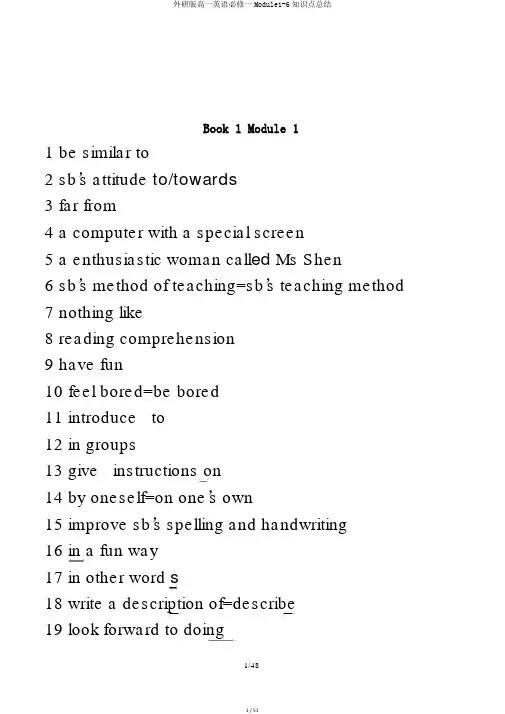
Book 1 Module 11 be similar to2 sb’s attitude to/towards3 far from4 a computer with a special screen5 a enthusiastic woman call ed Ms Shen6 sb’s method of teaching=sb’s teaching method7 nothing like8 reading comprehension9 have fun10 feel bored=be bored11introduce to12in groups13give instructions on14by oneself=on one’s own15improve sb’s spelling and handwriting16in a fun way17in other word s18write a description of=describe19look forward to doing20 be impressed with21 make (much) progress22 Would you mind do ing?23 at the start/beginning of24 at the end of25 receive the high school diploma26 go to college27 divide into28 be divided into29 take part in all kinds of activities30 summer vacation31 I live in Shijazhuang, a city not far from Bejingb5E2RGbCAP32 Every has a computer with a special screen, almostas big as a cinema screen..p1EanqFDPw33 Ms Shen’teaching method is nothing like that of theteachers at my Junior High school.DXDiTa9E3d34 I don’t think I will be bored in Ms Shen’sclass.RTCrpUDGiT35 In other words, there are three times as many girlsas boys. 5PCzVD7HxA36 For our homework tonight, we have to write adescription of the street where we live. jLBHrnAILg37 Some students were embarrassed at first, buteveryone was friendly and it was really very nice.xHAQX74J0X38 Ms shen gave us instructions and then weworked by ourselves.LDAYtRyKfE39 How are you doing?40 How is it going?41 Secondary school in the Us usually cover s sevenyears, grades six to twelve. Zzz6ZB2Ltk42 The school year is divided into two semesters, thefirst of which is September through December,and the second January through May.dvzfvkwMI143 The amazing news amazed us.44 The disappointing news made us disappointed.45 His disappointed expression suggested(that) hewas disappointed. rqyn14ZNXI46 join (us) in the game47 join an organization 加入一个组织48 join the party49 attend the wedding 参加婚礼50 attend the opening ceremony 参加开幕式51 This bridge is three times as long as that one.52 This bridge is twice longer than that one.53 This bridge is three time the length of that one. EmxvxOtOco54 There is three times as much money in my pocketas in yours.SixE2yXPq555 The climate of Bejing is quite different from that ofQingdao.6ewMyirQFL56 There is nothing like a holiday to make onehappy.kavU42VRUsBook 1 Module 11和相像2对于的态度3远离 ;远不是远非4一个带有特别屏幕的电脑5一个被叫做沈女士的热情肠的妇女6sb 的教课方法7一点也不像8阅读理解9玩地快乐10感觉厌烦11把介绍给12成组地,按组的13给对于的指示14经过自己15改良的拼写和书法16经过一种风趣的方式17换句话说18描绘19期望做20对印象深刻21获得 (很多 )进步22你介怀做?23在开始24在末端25获得高中文凭26去上大学27把分红 (整体分红部分 )28被分红29参加多种多样的活动30暑期31我住在石家庄,一个离北京不远的城市32每个教室都有一台电脑,带有几乎像电影屏幕相同大的特别屏幕33沈女士的教课方法一点也不像我初中教师的教学方法。
基础学习1.词汇记忆1.1反复阅读,强化记忆(学会使用单词);1.2单词-读音-音标,三者记忆时相辅相成;1.3做好计划,利用零散时间,反复阅读。
Module 1 词汇词组academic [,ækə'dɛmɪk] adj. 学院的,学术的province ['prɒvins] n.省enthusiastic [in,θju:zi'æstik] a.热情的amazed [ə'meizd] adj.惊讶的amazing [ə'meiziŋ] a.令人吃惊的information [,infə'meiʃən] n.信息,通知website [ web’sait] n.网站brilliant ['briljənt] a.(口语)极好的prehension [,kɒmpri'henʃən] n.理解instruction [in'strʌkʃən] n.(常复)指示,说明method ['meθəd] n.方法bored ['bɒ: d] adj.厌倦的embarrassed [im'bærəst] a.尴尬的embarrassing [im'bærəsiŋ] adj.使人尴尬的attitude ['ætitju:d] n.态度behavior [bi'heivjə] n.行为,举止previous ['pri:viəs] a.以前的adv.以前description [di'skripʃən] n.描述technology [tek'nɒlədʒi] n.技术impress [im'pres] vt.给…深刻印象correction [kə'rekʃən] n.改正encouragement [in'kʌridʒmənt] n.鼓励enjoyment [in'dʒɒimənt] n.享受,乐趣fluency ['flu:ənsi] n.流利misunderstanding[,misʌndə'stændiŋ] n.误解disappointed [,disə'pɒintid] adj.失望的disappointing [,disə'pɒintiŋ] adj.令人失望的system ['sistəm] n.系统;制度teenager ['ti:nidʒə] n.青少年disappear [,disə'piə] vi.消失move [mu:v] vt.搬家,移动assistant [ə'sistənt] n.助手cover ['kʌvə] vt.包括 n.盖子diploma [di'pləumə] n.毕业文凭,学位证书重点词组in other words 换句话说look forward to doing sth. 期待;盼望look for 寻找be impressed with 对…印象深刻be different from 与…不同at the start of 在……开始的时候at the end of 在……结束的时候be divided into 被(划)分成……take part in 参加2.语法基础2.1语法入门主语:句子或者句意的主要人物或事物,一般在句首。
单词1.amazing adj.令人惊讶的归纳拓展(1)amazed adj.惊讶的amaze vt.使惊奇,使惊愕amazement n.惊讶,惊奇(2)be amazed at/by...对……大为惊奇be amazed to do sth.因做某事而感到惊奇be amazed that...惊奇的是……sth.amaze(s) sb.某物使某人感到惊奇to one's amazement令某人惊讶的是……例句:I find it amazing that he can play the violin.他会拉小提琴令我大吃一惊。
We were amazed by the change in his appearance.他相貌的变化使我们大为惊讶。
She was amazed/It amazed her that he was still alive.他居然还活着,这使她感到惊讶。
To my amazement,he was able to recite the poem from memory. 令我大为惊奇的是,他把这首诗从头到尾背了出来。
【链接训练】The________expression on her face suggested she was________when she heard the news.A.amazing;amazed B.amazed;amazing C.amazed;amazed D.amazing;amazing【解析】考查amazing和amazed的用法区别。
amazing“令人惊奇的”,一般用来修饰事物,说明其状态或性质;amazed 一般用来修饰人的感受和表情等。
句意为:她脸上吃惊的表情说明了当她听到这则消息时很惊讶。
【答案】 C 2.impress vt.使印象深刻;使铭记在心;使……明白重要性归纳拓展(1)impress sb.with sth.某事给某人留下印象impress sth.on/upon sb.使某人铭记某事be impressed by/with/at 为……所感动;对……有印象(2)impression n.印象;感觉;感想impression of...对……的印象,感觉,看法leave/have/make a(n)...impression on sb.给某人留下……的印象(3)impressive adj.给人印象深的;令人赞叹的例句:Li Kang is very impressed with the teachers in his new school.李康对新学校里的老师印象深刻。
外研版高一英语必修一Module 1词汇构词法讲解1.academic=academ学术+ic(形容词后缀)academy n。
学院,学术团体;2.province=pro—(前缀,表示“向前,在前,变体”pur-”)+vince(vict—,vinc-=conquer, overcome,表示“征服,克服”)procincial adj。
省的,州的,外地的;3.enthusiastic=en—(前缀,加强、更)+thusias-(神,热)+tic(形容词后缀)enthusiasm n. 巨大的热情,热心;4.amaze=a-(前缀,表加强)+maz(e)(迷宫,迷惘)+-ing(形容词后缀,物作主语,。
..的)amazed adj. 吃惊的;惊讶的rmation=inform(通知,告知)+ation(名词后缀)6.website=web(网)+site(站点)7.brilliant=brilli(发光)+ant(形容词后缀)prehension=com-(共同)+pre(往前)+hend(抓住)+sion(名词后缀)comprehend v。
理解comprehensive adj. 有理解力的, 广泛的,综合的9.instruction=in-(前缀,内,里)+struct(建立)+ion(名词后缀)instruct v.指导,指教,命令10.method=me(走)+thod(太好了)11.bored=bore(v.使厌烦)+(e)d(形容词后缀)boring adj.无聊的12.embarrassed=em(前缀,进入)+barrass(套子)+ed(形容词后缀)embarrass v。
使难堪embarrassing adj。
令人尴尬的,令人难堪的,物作主语13.attitude=att(能力,倾向)+itude(抽象名词后缀,。
..的度)14.behaviour=be(是,值)+hav(抓,取,拥有)+iour(抽象名词后缀)behave v。
外研版高中英语必修一UNIT11、academic adj. 学术的将最后一个字母C移至单词首位,Caca demi拼记:擦擦得米学术的——书——书中自有千钟粟———擦擦得米例句:This is not merely an academic question.这不仅仅是一个学术问题。
组词:academic conference 学术研讨会 ; 学术会议 ; 研讨会academic dean 教务长 ; 教务员 ; 教务院长academic year 学年academic achievement 学业成就;学业成绩academic performance 学习成绩;学业表现;学术成就词根:academeadv.academically 学术上;学业上n.academy 学院;研究院;学会;专科院校academia 学术界;学术生涯academician 院士;大学生;学会会员;大学教师1.province n.省Pro 皮肉同意。
选举人送我荦的“皮肉”我就“同意”选他。
Con 葱不同意,反对。
如果他送我素的“葱”我就“不同意”选他。
就投他的反对票。
谐音“抗”。
pro 同意V“yu”电脑键盘上用“V”来代替汉语拼音中的“ü”。
vince遇一弄潮儿只要“遇一弄潮儿”,我就“同意”他当一“省”之长。
要是“遇一难缠儿”,我也“同意”他当一“省”之长。
This university isdirectly under the Province.这所大学由省直接管。
guangdong province(中国)广东省shanxi province山西省;陕西省比较:prince 王子,太子太子当个“省”长应该是绰绰有余的。
P r i n c e骗人也能成呃——狸猫换太子故事。
怕仍要难产儿派人要弄潮儿短语:a prince among men 性格不凡的人;品格高尚的人;正人君子2.enthusiastic adj.热心的ent 儿女疼husia 护士爱stic 身体差儿女、护士都是对待老年病人“热心的”人。
外研社⾼⼀必修⼀英语笔记详细外研版⾼⼀英语必修⼀重点词组Module 11. in other words 换句话说2. look forward to (doing) sth.期盼(做)某事3. at the start/beginning of 在……开始的时候4. at the end of 在……结束的时候5. go to college/university 上⼤学6. be divided into 被(划)分成……7. take part in 参加= participate in sth8. be similar to 与……相似9. one’s attitude to sth 某⼈对某物的看法10. be impressed with sth.对……印象深刻11. leave/have/make an impression on sb.给某⼈留下印象12. mind doing sth 介意做某事13. all kinds of after-school activities各种各样的课外活动14. by oneself 单独,独⽴15. be disappointed with/in sb对某⼈感到失望16. be disappointed at/about /with sth对某事感到失望17. in a fun way ⽤有趣的⽅法18. be/get bored with sth 对某事感到厌倦19. be/get bored with doing sth.对做某事感到厌倦20. introduce sb./sth. to sb.把某⼈(某物)介绍给某⼈21. introduce sth. into/in 把某物引进……22. on one’s /the way to… 在……途中22. on the way home 在回家的路上23. by the way 顺便说⼀下;在路旁24. in the way 碍事,挡路25. lose one’s way 迷路26. by the end of到……结束时(常与完成时连⽤)27. be amazed at/by 对……感到惊讶28. invite sb to do sth 邀请某⼈做某事29. ring up 打电话30. feel lonely 感到孤单31. try doing sth. 试着做某事32. try to do sth 努⼒做某事33. take off 起飞, 脱掉(⾐物)34. make rapid/great/a lot of progress 取得(很快/很⼤)进步35. a description of sth ….的描述describe sth.36. keep doing sth. 不停地做某事37. be on time for 按时参加……38. be well organised 有条理的39. admit doing sth承认做过某事40. as a result 因此,结果41. fall asleep 睡着42. be strict with sb. 对某⼈严格43. be fluent in 在……(⽅⾯)流利44. speak Chinese with fluency流利地说汉语= be fluent in Chinese汉语流畅45. feel embarrassed 感到尴尬46. to one’s embarrassment 令⼈尴尬的是47. the number of ……的数⽬48. a number of 许多49. receive the high school diploma获得⾼中的⽂凭50. explain sth to sb向某⼈解释某事Module 251. be strict with sb. 对某⼈要求严格52. be strict in… 在……⽅⾯要求严格53. be strict about sth. 对某事要求严格54. make sure of sth. 弄清楚某事;查明某事55. make sure that… 弄清楚…56. I would appreciate it if…如果……,我将不胜感激。